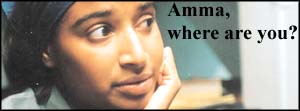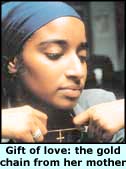 |
 15th August 1999 |
Front Page| |
Contents
|
||
 |
Amma, where are you?Adopted when just a babe, Eranthi grew up in Sweden. Two years ago, she decided to look for her 'birth mother'…By Kumudini Hettiarachchi
And every October 19, she would wonder whether "someone somewhere was thinking of me." Yes, October 19 is special because it is Eranthi's birthday. With it came many questions. "What is my real mother like? Why did she give me up? Does she think of me? Is she dead? Did she have many children? Was she poor and unable to look after me?" But no answers. The doubts lingered, as she grew up in Helsingborg, a southern Swedish town. Then life changed, when she met Niclas Rolander, a student of journalism. Niclas asked her a lot of questions. By this time her foster parents had told her that she was from Sri Lanka, and Niclas wanted to know whether she didn't want to visit the country. To Niclas it was obvious that it was a "sensitive" issue, but he kept approaching it gently. It took two years before he could persuade her to "disclose" her Sinhalese name. It was as if she hated the name "Eranthi Shanika". One day they decided to come to Sri Lanka "only to travel". They didn't want to find out anything. "I didn't want to get hurt," pixie-like Eranthi stresses, her eyes shining brightly. Just a week before they left for Sri Lanka, in March 1997, her foster parents, Margaretha and Sebastian Christer gave her a folder full of documents. It was like being reborn. These were the adoption papers before her in black and white. Her first passport with the place of birth as "Colombo". Another clue — the name and address of the institution from where she changed hands, when she was just five months old. Then Eranthi and Niclas were in Colombo. It was Easter time. She called the institution, but the people were busy. Finally, the day was arranged and there she was. The welcome was warm, but she was told in no certain terms that they could tell her nothing about her mum and dad because it was "confidential". She spent time there. There were "mothers and there were babies". The women were unwed mothers, and in a society where it is a stigma to have a baby out of wedlock, they "hid" themselves when the "belly started to show, had the baby and then gave the baby up for adoption, sometimes even after a year." Then they went back to society as if nothing had happened. Life returned to normal for the woman and her family. Or did it ever? Eranthi, also came into contact with "Akka" who was looking after the babies. When she left the institution that day she was invited to visit again. A few weeks later she called. Yes, they told her, she could live in the institution for some time, but she had to make herself useful. About 300 young girls in the age group 12 to 19, who had been difficult to control were also in the care of the institution. Could she help them? Did she knit or sew? No, but she could dance, so she offered to teach them modern dancing. They accepted and she moved in. Eyes sparkling, face full of expression, Eranthi says she was very happy living there. There were 20 mothers and as she passed the 20 cots, some painted pink and others blue, there seemed to be "lots and lots of babies. It was like a factory, but in a good way," she hastens to add. "I felt weird. I too had been there so many years ago.....in 1977. The room was simple and very basic. But it was warm, not like a hospital room which is so strict and sterile." One night, while having dinner with "Akka" in the kitchen, their "chat" turned to her mother. "Akka" casually said, "I can check it up." The next night she brought an old faded note-pad with "Mothers' Book" written across it. There were all the details right before her. Her mother's name, religion, date of birth. Eranthi was "delirious". She memorized the address. The next day she was curtly told by "Akka" not to "do anything as the head of the institution was angry with her for revealing the details." Later Eranthi travelled around Sri Lanka with Niclas. A week before returning to Sweden a debate raged within her. Should she leave the information she had alone or just take a look at the home of her mother? If her mother was married there could be trouble. She may not be interested in the child she gave away so many years ago and it was a "huge risk". But she just couldn't give up. "I was so curious, I had to go there." Three days before their flight, she and Niclas went to the Colombo south suburb "only to look at the house." She hung around, then went up to the gate leaving Niclas at the corner. But there was no satisfaction. "I was this close. .....I had crossed a line and there was no turning back." She knocked on the gate, but there was no answer. A passer-by stopped and when asked, claimed there was no such person with the name of her grandfather. In a little while the neighbourhood was gathered there, talking in Sinhala and gesticulating. When she mentioned her mother's name, they were inquisitive. Someone muttered that the woman was in Luxembourg. Nothing was happening and Eranthi dropped a bombshell "She's my mother." Stunned silence, whispering and more questions. She was then taken into a house. From the conversation she realised that her mother's family may have hidden the true story from their relatives. They produced an address in Berlin as that of her mother's and also a photo, which a small child ultimately chewed up, Eranthi recalls, as if the incident happened yesterday. She left her foster parents' address and phone number in Sweden with her mother's relatives and left. Back in Sweden, "to write or not to write" to the address in Berlin consumed her. Even if she did write what was she to say to the woman who had given her up? she anguished. In August 1997, she did write. She'd just finished, when she got a call from her foster dad wanting to meet her. She was living in an apartment on her own then. But she was not in the mood. With her world turning upside down, she just wanted to be alone. But Sebastian was adamant. They came and picked her up for a drive. Her whole foster family, her mum, dad, brother and grandmother. The words, "Your biological mother called today," left her speechless. She could call her in Germany. She didn't know what do to. She wanted desperately to talk to Niclas, who was in Stockholm, as he knew her innermost thoughts and had shared all her experiences in Sri Lanka. But he was out. She was nervous. Several times she picked up the phone to dial her mother's number, but didn't. At last she did and they talked a lot. Her mother was spontaneous and kept saying, "I'm so happy. I want to see you." Eranthi also heard about her new family. Her mother was married to a German, whom she had met when she went to visit her sister who was working there. She had a 14-year-old son, Stefan. She was working with old people under a social service scheme being administered by the church. A week later, Eranthi was at the train station awaiting the mother she had not seen since babyhood, while Niclas stayed out of sight. The train came and she looked at each and every woman who passed her, wondering. She had only a hazy idea what her mother looked like from the chewed-up photograph. But her mother would recognize her as she had left a recent photo of herself with her relatives in Sri Lanka. And then she came, bent under the weight of heavy bags. "Should I hug her? Should I shake her hand?" Before she could decide, her mother hugged her tightly. They then walked to Eranthi's apartment, with Niclas doing all the talking and Eranthi just looking at her, the woman who had carried her for nine months and then given her away. And the pieces of Eranthi's life fell together like a giant, 20-year jigsaw. The pieces which had been strewn across half the world were slowly forming a picture. It was also flashback time — 1976. Her mother (19), from a middle class family was attending a stenography class. From her seat near the window she could see a youth who owned a cloth shop across the street, coming out for frequent breathers. They smiled, made eyes at each other and flirted. In the end she flunked the course. "There was no stenography diploma, no job, only a pregnancy and a baby." In Eranthi's words. The moment the young man heard of the pregnancy, he did not want to have anything to do with her. Her mother's parents were aghast. What would society say? So they hid her in the institution. Time passed and she had a baby girl. Her family brought the baby's father and showed her to him. But he was not interested. Five months later, in tears she signed the papers for the adoption. She was in deep depression and went to live at her brother's home, as he had a little girl too.......she looked after that baby, yearning for her own little one and named her after "Eranthi Shanika". Her heart bled for the baby she had suckled at her breast, just for awhile, but whom she was never destined to hold and care for. The girl she would never see reach womanhood. Then she left for Germany and met her future husband and made a life for herself. But the heartache was always there. Five years after the birth of Eranthi, she went back to the institution and begged, "Can I please have my baby back?" But it was futile. When Stefan was born, she brought him back to Sri Lanka. When her father wanted to carry Stefan, her heart constricting with anger she had said, "You didn't want my first-born, so you can't have this baby too." That was long ago. Back in Sri Lanka for a visit once again, not only is Eranthi here with Niclas, but also her own mother, stepfather and Stefan, with whom she has a close bond. Eranthi is enjoying all her new-found cousins and relatives.
Front Page| News/Comment| Editorial/Opinion| Business| Sports | Mirror Magazine |
|
 |
Please send your comments and suggestions on this web site to |
|
 She
instinctively felt different from the time she was a toddler. In kindergarten
other children said she was "chocolate-coloured" while her parents
were white. She knew she was not one of them. Her family didn't treat her
differently, in fact they were kind, loving and generous, but that feeling
was there. At an early date she knew she was adopted.
She
instinctively felt different from the time she was a toddler. In kindergarten
other children said she was "chocolate-coloured" while her parents
were white. She knew she was not one of them. Her family didn't treat her
differently, in fact they were kind, loving and generous, but that feeling
was there. At an early date she knew she was adopted.